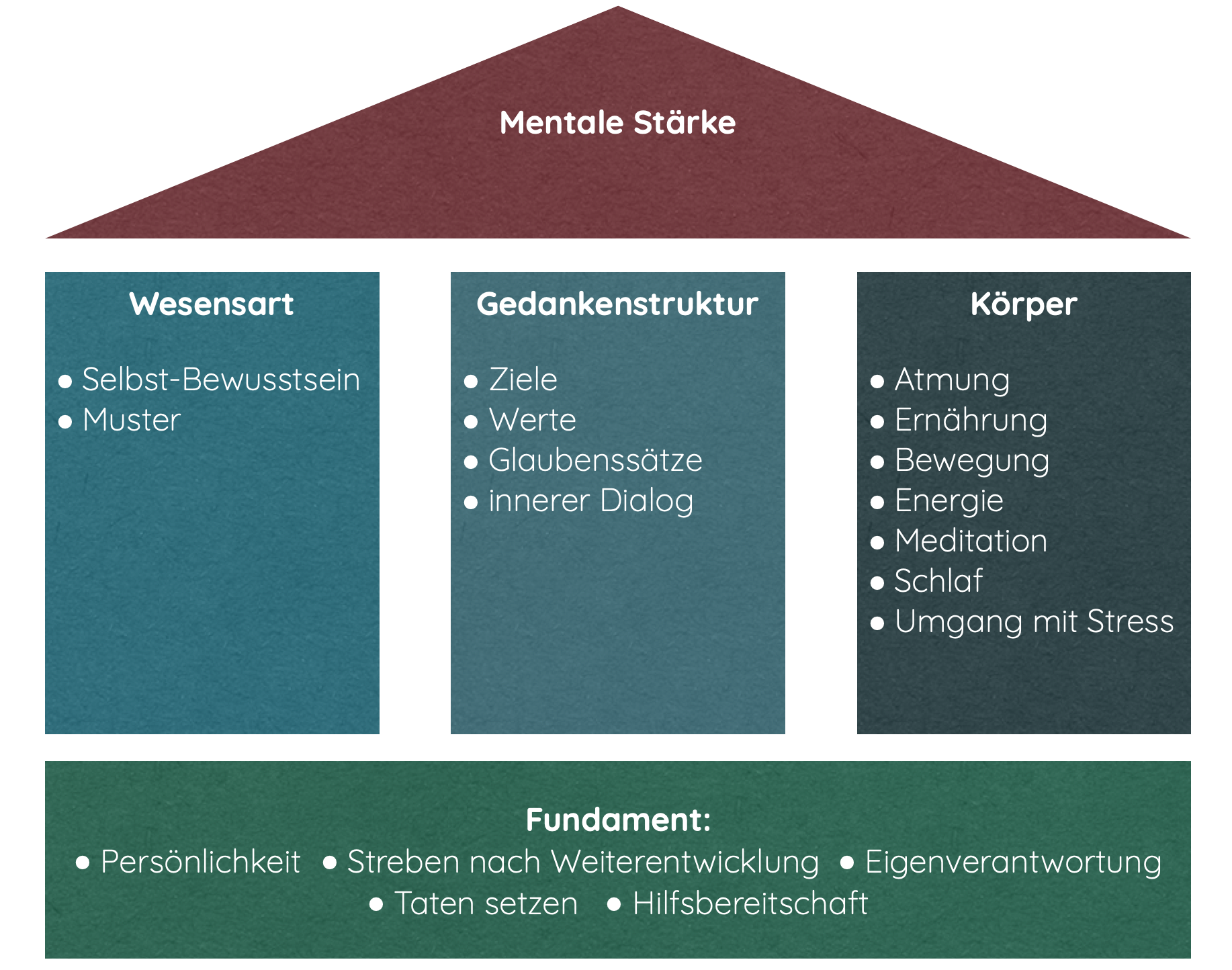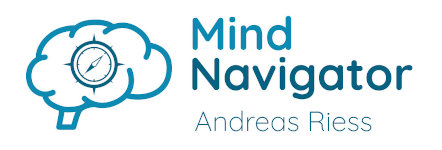The pillars of mental strength.
Welcome to my blog, where you will get more information and I will show you tools on how to build your inner strength.
Goal of mental training:
One goal of mental training is:
„Being good when it counts“ or
„Reacting the way I want to react in any situation“.
I will explain what this means in concrete terms in the next few lines and in detail in the following chapters. With mental strength you manage to react at the right time as you want and to exploit your potential at the right time.
Your personal autopilot:
In general, it should be noted that a large part of the actions we perform on a daily basis are unconscious and occur on autopilot, so to speak. Imagine, for example, that every time you drive a car you have to actively think about what you have to move and how in order to get out of the parking space. Another example is going home from work and you want to do some shopping, but you find yourself at home instead of at the supermarket parking lot. This is where your „autopilot“ brought you home.
These automatic actions consume less energy than conscious decisions and actions. If you are learning a new act, such as juggling, unicycling, or skiing, you will notice how you get tired after a few practices. Later, these movement sequences are no longer strenuous for your brain.
Your subconscious mind is also much faster than your conscious mind. You may also have experienced situations while driving where you intuitively stepped off the gas and only later realized a dangerous situation.
Many actions, decisions and reactions occur unconsciously. This usually helps you, however, these unconscious decisions and actions can also get in the way of your goals. With mental training you can make yourself aware of these unconscious processes and change them „if desired“. Mental training also helps you to go through certain situations in advance and possible obstacles or challenges, so that when such an obstacle arises, you already have your desired reaction and action ready and can call it up.
The 3 pillars of mental strength:
From my point of view, 3 pillars support mental strength:
- one’s own nature
- the thought structure and
- the body.
These three pillars are also those areas that can be trained and optimized with appropriate exercises.

The foundation:
With any building is important to have a strong foundation. In terms of the three-pillar model, the foundation is the basis for activities and aspects that build on it. If you want to be mentally strong, these components are essential.
Your personality is the physical and mental foundation you bring to the table. That’s how your brain is „wired.“ The other aspects are part of your inner attitude and prerequisite of possible trainings or changes. If you don’t want to evolve, what targeted changes should be possible? Additionally, ownership is an important part of the foundation. Only when you are aware of your responsibility to yourself, then you can change something. What will you change if someone else is responsible for your mental strength? It also follows that you take your actions into your own hands and take action. In summary, this means that someone can give you tools on how to achieve inner strength, but you have to use them.
Willingness to help is part of the foundation, because from my point of view, acting selfishly only with regard to oneself is not a sign of mental strength.
A scientifically based method for describing personality is the Big-Five or OCEAN model, which has already been proven in thousands of studies. Recent research has optimized the model and each category has been divided into two aspects. This is the origin of the Deep-OCEAN model.
Nature:
The pillar of the nature of being is formed in dealing with one’s own personality and the behavioral patterns acquired over the years. This is about self-awareness, in the sense of: You are aware of yourself. Only when you really know yourself can you understand why you feel, think and act the way you do. Then, if you want to, you can do something about it. This refers to the characteristics of your personality as well as your behavioral patterns. The difference between personality and patterns is this. Your personality is quite stable since childhood around the age of 5. Patterns form based on your life experience and then run unconsciously. Dr. Eckhard von Hirschhausen once told a parable about a penguin. Here he aptly mentioned, „People rarely change completely and fundamentally. If you were born a penguin, even seven years of psychotherapy won’t turn you into a giraffe.“
Personality doesn’t change, what you can change is how you handle your personality. Here we are back at the points of „taking responsibility“ and „taking control of one’s own actions“ in the foundation. Some tend to use their personality profile as an excuse for your behavior, only then nothing can or will change. I, for example, have become aware through my personality evaluation why I have stood in my own way in some aspects in the past and why I have been easier in other areas. If you are pursuing a goal, it will be easier for you to achieve it if you are aware of the most important hurdles and have thought about how to overcome them beforehand. This applies to outside influences as well as hurdles due to your personality.
Patterns can help you overcome these hurdles. Many people with a high level of enthusiasm tend to make spontaneous decisions, e.g. when it comes to buying behavior. They see something, get excited about it, and they buy it. If this applies to you, you set a goal to save money for an investment, then this spontaneity can make it difficult to achieve your goal. Here, patterns (e.g., sleeping on it for a night before making certain purchases) can help you rethink certain desires.
Thought Structure:
The thought structure (we often use the English word „mindset“) is the second pillar.
The first building block of this pillar is the goals. In a nutshell, it’s about the question „What do you want?“.
„Only those who know where they want to sail set their sails correctly.“ (Jürg Meier)
Without knowing your goal, you won’t know what steps are necessary to reach it. Here it is important that your goal is defined in such a way that it describes the target state, i.e. answers the question „Where do you want to go?“. There is a saying „If you don’t know your destination, no road is the right one for you.“
The next building block of this pillar is formed by the values. This is about what is important to you. Values are an inner guide for you to make decisions. They stake out your „playing field,“ so to speak. They depend on your areas of life (e.g. work, private) and your life phases.
Another building block of this pillar is your beliefs. Beliefs also guide you on your path. Again, certain beliefs may be a hurdle to your goal. The belief „the plate will be eaten empty“ is a hindrance if you want to lose weight, especially in situations where you cannot directly influence the amount on the plate, such as in a restaurant.
The fourth building block is the inner dialogue. Observe your inner voice. How do you speak to yourself? Often the inner dialogue is anything but respectful and uplifting. How do you feel when a mishap happens to you and someone says to you, „You might be an idiot“. Here you surely react hurt and angry. Many say just that to themselves when they are angry with themselves after a mishap. If your inner dialogue often berates and insults you on a daily basis, how easy is it for you to build mental strength?
Body:
Your body and how you treat your body is the third pillar of mental toughness.
Here, the individual building blocks, such as breathing, nutrition, exercise, sleep, energy, meditation and dealing with stress, influence each other. If you lack adequate sleep, you also lack energy, which ultimately makes it harder for you to deal with stress. Breathing has a significant impact on the body and mental abilities. Only when the body and brain are supplied with sufficient oxygen can they work optimally. Stress and how to deal with it is also an important aspect. Flow happens when you are challenged to the right degree. If the stress level is too low, then you are bored and your mind wanders and you act on a pattern level. If the level is too high, it also blocks your cognitive abilities and you react with stress patterns. Wrong diet can also affect your mental abilities.
More information:
I hope I have piqued your interest. In this blog you will get more information and exercises on each pillar and its aspects.

